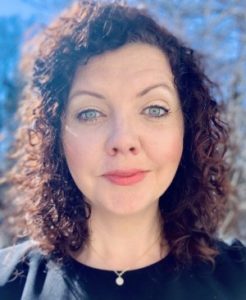No one, not even church folk, like talking about celibacy let alone white supremacy. Celibacy and white supremacy — like sexuality and skin color — are two preferably avoidable conversations.
Perhaps these conversations are sidestepped because they invoke images that don’t seem to be applicable for us today. Conversations about white supremacy are reduced to images of Southern men from a century ago wearing bedsheets with eye holes their wives cut out. Conversations about celibacy exchange holey sheets for holy twin-size monastic beds. But what if we have been approaching both conversations, celibacy and white supremacy, with limited imaginations?

Erica Whitaker
Celibacy is not simply about not having sex between the sheets. And for that matter, white supremacy is not simply about not lynching African Americans while wearing white bedsheets.
A year ago, I was taught about sex and celibacy by a funky nun named Sister Meg who convinced me that celibacy is a spiritual discipline that stretches beyond sexual abstinence. She was speaking to a room full of young clergy about deadly sins and afflicting thoughts when the topic of sex came up.
Sister Meg proceeded to lecture the room of vibrant young women and men on how everyone is called to the discipline of celibacy. For the first few minutes of her monologue, the room fell into a stone-cold silence as if Jesus himself dumped an ice bucket over our carnal conversation. But soon Sister Meg would enlighten us all with a reimagination of the word “celibacy.”
In her book Thoughts Matter, Sister Meg defines celibacy as simply being in covenant relationship, a “relationship governed by a vowed vocation.” She says celibacy is not an act of repressing sexual desires but rather a redirection of the powerful energy to evoke a great capacity to love God and others. In her view, to be celibate is to live beyond the self, allowing the heart to move toward anything that matters to the heart, an apostolic love that is greater than any individual capacity.
“To be celibate is to live beyond the self.”
Her wisdom expands new possibilities of being. If all humans would choose the life of celibacy, then we all would vow to live in covenant relationships with God and each other. And if sex, created for good by God, was simply one dimension of being in loving relationships then we could stretch the practice of celibacy beyond the bedroom.
Sex is often viewed by puritanical principles as a destructive practice or erotic urge used to manipulate, degrade and seduce people into a life of sin. Yes, this can and does happen too often in broken relationships where power is used to destroy lives. But the act of sex is the not the root problem. The core issue is the abuse of power and the broken covenants that create pockets of dehumanizing behavior that regenerate generation after generation.
Power is the bridge between celibacy and white supremacy. Where celibacy call us into balanced loving relationships of mutual power toward God and others, white supremacy breaks loving relationships with the abuse of power that goes against God and others.
Remember that white supremacy, like celibacy, isn’t limited to how a person does or does not utilize their bedsheets. The understanding of “white supremacy” is often limited to our lack of imagination and, if we are really honest, an apathetic read of our country’s history.
“White supremacy, like celibacy, isn’t limited to how a person does or does not utilize their bedsheets.”
Recently, I read the book White Too Long: The Legacy of White Supremacy in American Christianity, written by a white scholar, Robert P. Jones. Like Sister Meg, he has helped me redefine dated words we all thought didn’t apply to us today. In his opening chapter, Jones leans on Eddie Glaude Jr, a professor of African-American studies at Princeton University, to illuminate the core understanding of white supremacy: “On a broader level, white supremacy involves the ways a society organizes itself, and what and whom it chooses to value … a set of practices informed by the fundamental belief that white people are valued more than others.”
For the next 300 pages, Jones unravels the myths and misleadings of his own religious upbringing and the current state of white supremacy in our country. I now see with a bit more clarity that white supremacy — or the “supremacy of whites” — is an ideology rooted in everyday life passed down often unconsciously from generation to generation by implicit practices and even religious beliefs.
So, what if there were one possible solution, a radical and imaginative way of ending white supremacy? Celibacy. If we all live celibate lives together — as Sister Meg defines the word — we might be able to celebrate an end to racism, sexism and all the other “-isms” of our day that continue to create sinful schisms throughout human history.
A call to celibacy is a call to living in covenant relationships that vow to embrace each other in deep, soulful ways of mutual love for God and for others. Where white supremacy teaches the abuse of power based upon skin color, celibacy teaches the embrace of power based upon our sexuality. God creates humans to live in community, to live in committed reciprocal loving relationships that never abuse power and dehumanize people. A life of celibacy is a promise we make to one another that allows God’s love to grow beyond our sinful behaviors and beyond our false ideologies.
White supremacy is a sinful, false ideology and a theology that needs a radical spiritual revival in our country. But until the heart of our democracy embraces the call to celibacy, our country will remain in a cycle of racist policies, economic inequality and, God forbid, religious heresy.
But I remain hopeful for the resurrection of our country. I believe the day is coming when America will wake up, slip out from the bedsheets that once abused power and embrace a “celibatory” way of being in the world.
Erica Whitaker serves as senior pastor of Buechel Park Baptist Church in Louisville, Ky. She is an avid reader of science, religion and God-knows-what and also enjoys writing fantasy novels. Erica is currently working on a Ph.D. through the International Baptist Theological Studies Centre at the Free University of Amsterdam. She and her husband, Josh, live in Louisville with their two four-legged children, Fred and Lucy.


